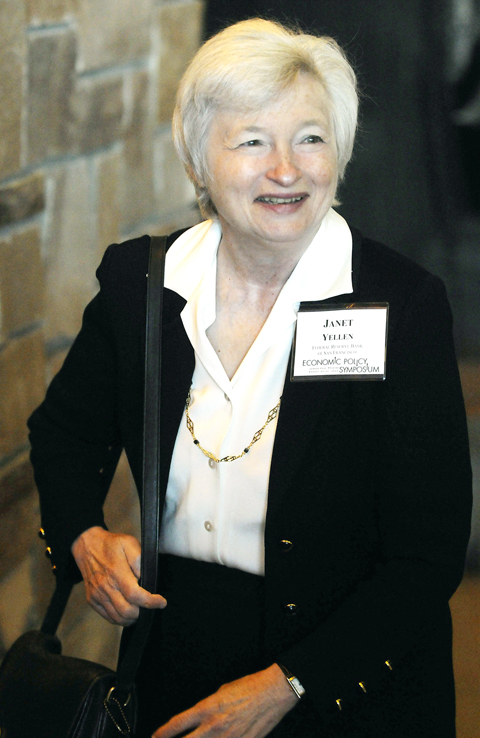US President Barack Obama plans to nominate San Francisco Federal Reserve Bank President Janet Yellen, a respected policy dove, to be vice chairman of the central bank, a source familiar with the process said on Thursday.
Yellen would replace Donald Kohn, a 40-year veteran of the Fed who announced earlier this month that he would retire on June 23. The nomination for the four-year term as the Fed’s No. 2 would be subject to Senate approval.
Yellen is considered one of the most “dovish” of the central bank’s policymakers, meaning she is seen to lean toward policies that will boost growth and promote employment rather than those aimed at keeping inflation at bay.

PHOTO: REUTERS
Reached by telephone she declined to comment, as did the US Treasury Department. The White House did not respond to requests for a comment.
Kohn’s impending departure means that Obama has three seats to fill on the seven-member board of the US central bank. The source said top candidates had been identified for each of the three spots, but all selections, including Yellen’s, are subject to completion of a vetting process.
The source said the administration was also vetting a number of other candidates in case any of its top picks fell through.
One of the people under consideration to fill a board seat is Sarah Bloom Raskin, the top bank regulator for the state of Maryland, a different source familiar with the process said.
The administration’s decision to narrow its search to include Yellen and Raskin was first reported by Bloomberg.
Yellen was chairwoman of the White House Council of Economic Advisers under President Bill Clinton between 1997 and 1999 and a Fed governor between 1994 and 1997.
Currently Maryland’s commissioner of banking regulation, Raskin is a lawyer who previously worked at Promontory Financial Group, the Senate Banking Committee, and the New York Fed.
Among other names cited as possible candidates for the third vacancy are Massachusetts Institute of Technology economist Peter Diamond, Harvard economists Jeremy Stein and David Scharfstein, and Johns Hopkins University economist Laurence Ball.

MORE VISITORS: The Tourism Administration said that it is seeing positive prospects in its efforts to expand the tourism market in North America and Europe Taiwan has been ranked as the cheapest place in the world to travel to this year, based on a list recommended by NerdWallet. The San Francisco-based personal finance company said that Taiwan topped the list of 16 nations it chose for budget travelers because US tourists do not need visas and travelers can easily have a good meal for less than US$10. A bus ride in Taipei costs just under US$0.50, while subway rides start at US$0.60, the firm said, adding that public transportation in Taiwan is easy to navigate. The firm also called Taiwan a “food lover’s paradise,” citing inexpensive breakfast stalls

TRADE: A mandatory declaration of origin for manufactured goods bound for the US is to take effect on May 7 to block China from exploiting Taiwan’s trade channels All products manufactured in Taiwan and exported to the US must include a signed declaration of origin starting on May 7, the Bureau of Foreign Trade announced yesterday. US President Donald Trump on April 2 imposed a 32 percent tariff on imports from Taiwan, but one week later announced a 90-day pause on its implementation. However, a universal 10 percent tariff was immediately applied to most imports from around the world. On April 12, the Trump administration further exempted computers, smartphones and semiconductors from the new tariffs. In response, President William Lai’s (賴清德) administration has introduced a series of countermeasures to support affected

CROSS-STRAIT: The vast majority of Taiwanese support maintaining the ‘status quo,’ while concern is rising about Beijing’s influence operations More than eight out of 10 Taiwanese reject Beijing’s “one country, two systems” framework for cross-strait relations, according to a survey released by the Mainland Affairs Council (MAC) on Thursday. The MAC’s latest quarterly survey found that 84.4 percent of respondents opposed Beijing’s “one country, two systems” formula for handling cross-strait relations — a figure consistent with past polling. Over the past three years, opposition to the framework has remained high, ranging from a low of 83.6 percent in April 2023 to a peak of 89.6 percent in April last year. In the most recent poll, 82.5 percent also rejected China’s

PLUGGING HOLES: The amendments would bring the legislation in line with systems found in other countries such as Japan and the US, Legislator Chen Kuan-ting said Democratic Progressive Party (DPP) Legislator Chen Kuan-ting (陳冠廷) has proposed amending national security legislation amid a spate of espionage cases. Potential gaps in security vetting procedures for personnel with access to sensitive information prompted him to propose the amendments, which would introduce changes to Article 14 of the Classified National Security Information Protection Act (國家機密保護法), Chen said yesterday. The proposal, which aims to enhance interagency vetting procedures and reduce the risk of classified information leaks, would establish a comprehensive security clearance system in Taiwan, he said. The amendment would require character and loyalty checks for civil servants and intelligence personnel prior to